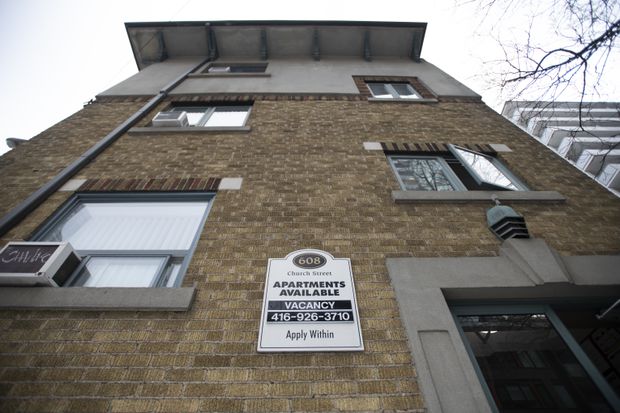
A sign for apartments available for rent in a building at 608 Church St. in Toronto on Jan. 28, 2021. FRED LUM/THE GLOBE AND MAIL
A certain four-letter word comes up a lot when financial planners address young adult clients who fear they will never own a house.
The word is rent. R-e-n-t. Say it with me and then let’s dig into how planners are tackling the challenge of mapping a way for millennials and members of Gen Z into a housing market where prices keep soaring.
Part of being a financial planner is providing a practical take on a client’s hopes and dreams and not being a cheerleader for home ownership. With housing affordability slipping as prices rise, this often means having a discussion on renting.
“It’s explaining that renting isn’t a financial coffin,” said Shannon Lee Simmons, a certified financial planner (CFP) with the New School of Finance. “I think that the stigma still exists where, if you don’t own a home, you feel like you’re financially shut out from security, a good retirement and all that stuff.”
Not owning a house, with its mortgage payments and maintenance costs, can free you up to save and invest for the future. Homeowners end up with lots of equity, while the financially astute renter has a big investment portfolio. There is a tax advantage to home equity in that you can sell a principal residence tax-free, but the renter’s investment portfolio can be deployed with a lot more flexibility than equity in a home you’re living in.
Nicholas Hui, a CFP with Vave Financial Planning, said he runs projections for his young adult clients that show how their finances might look if they bought at today’s prices. “There may be trade-offs that they didn’t know about,” Mr. Hui said. “We can then say, okay, what do your finances look like if you’re renting a place? Maybe you’re able to accomplish life goals like starting a business or travel.”
Mr. Hui said he’s actually had some success getting young adult clients to understand the sacrifices required if they buy a home at current prices. “Some say it’s really their life goal to own a house, but others pause and then start adjusting their expectations.”
There are two sides to the sense of urgency young adults feel about home ownership – one is the financial anxiety about missing out as affordability declines and the other is the pandemic-driven desire to live in a place that offers the comforts of home.
To keep the dialogue about renting going while addressing the emotional side of housing, Ms. Simmons raises the idea of spending a little more on rent to find some place special. “It’s about getting a rental space that makes you proud and excited,” she said.
A few other ideas from Ms. Simmons for frustrated would-be buyers:
- Make your job fully remote: If you can arrange with your employer to work from home 100 per cent of the time, you free yourself up to explore cheaper housing in suburbs and more distant communities.
- Use TFSAs and RRSPs strategically: Save for a down payment in a tax-free savings account and then withdraw $35,000 to contribute to a registered retirement savings plan (assuming you have the room) at least 90 days ahead of buying a home; withdraw the $35,000 from the RRSP under the federal Home Buyers’ Plan and get a hefty tax refund as a result of the initial RRSP contribution.
- Power-save: While not a fan of extreme budgeting because it’s so hard to sustain, Ms. Simmons has noticed that some of her clients are saving like never before as a result of pandemic lockdowns. “I’ve been working with people who are really scrimping in the pandemic, then there have been people who have been hammering thousands a month into saving, which is bananas. It’s all the spending that used to go to other things.”
Both Ms. Simmons and Mr. Hui encourage frustrated clients to keep saving and stay patient, which requires some careful balancing of expectations. A price correction is possible, but housing has defied skeptics for more than a decade. If prices keep rising, a desperate client might reasonably ask why they shouldn’t plunge in before prices are completely out of reach.
“It’s super hard right now to think about being patient,” Mr. Hui acknowledged. “But buying a house is a life-altering decision. You don’t want to rush into it.”
ROB CARRICK
PERSONAL FINANCE COLUMNIST
The Globe and Mail, May 11, 2021
